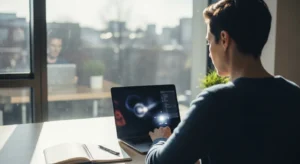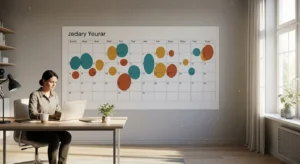
Frequently Asked Questions About Focus and Productivity
As a focus coach, I hear many of the same questions from people who are starting their journey to a more productive week. Here are answers to some of the most common ones, grounded in our understanding of how attention works.
1. Does listening to music or white noise actually help with focus?
The answer is: it depends. For some people, especially those in noisy environments, a consistent, non-distracting sound can be very helpful. White noise, binaural beats, or instrumental music (without lyrics) can mask jarring background sounds and help the brain enter a more focused state. The key is that the audio should be predictable and monotonous. Music with lyrics, on the other hand, can be a major distraction because the language-processing centers of your brain are activated, competing for cognitive resources. The best approach is to experiment. Try working in silence, with white noise, and with instrumental music, and see what helps you achieve a state of flow most easily. If it helps you monotask, it is a useful tool.
2. I know multitasking is bad, but I feel like I have to do it. How do I stop?
The “multitasking myth” is a powerful one. What we think of as doing two things at once is actually rapid, inefficient context switching. The first step to stopping is to fully accept the cognitive cost. Remind yourself that switching costs you time and mental energy. Start small. The goal is not to eliminate multitasking from your entire life overnight. The goal is to create protected blocks of time for monotasking. Begin with one 25-minute block each day dedicated to a single, important task. No email, no phone, no other tabs. Use your deep work entry ritual to begin. As you experience the clarity and productivity of these sessions, you will be more motivated to expand them. It is about building the monotasking muscle, one focused session at a time.
3. What should I do when my motivation completely disappears?
Motivation is a feeling, and feelings are fickle. They come and go. A productive week is not built on motivation; it is built on systems and rituals. When motivation is low, do not try to “think” your way into feeling motivated. Instead, rely on action. Use your thought tool of reducing friction. Make the first step so ridiculously small that you cannot say no. For example, instead of “write the report,” the first step is “open the document.” That is it. Once the document is open, the next step might be “write one sentence.” Action often precedes motivation. By taking a tiny, low-friction step, you begin to build momentum, and motivation often follows. Remember your scripted reset, too. A quick walk or a glass of water can be enough to shift your state and make that first small action possible. The brain’s health and ability to regulate motivation is a complex topic; for credible health information, you can always consult resources like the National Institutes of Health.
4. How can I protect my evenings so I can actually rest and recharge?
Protecting your evenings is one of the most important things you can do for next-day productivity. The key is creating a hard boundary, and this is where the shutdown ritual is invaluable. When you perform your shutdown ritual, you are making a conscious decision to end the workday. This is a clear signal to your brain. To reinforce this, create friction for re-engaging with work. Leave your work laptop in your office or bag. Turn off work-related notifications on your phone after a certain time. Create an “after-work” routine that you look forward to, whether it is exercise, cooking, reading, or spending time with loved ones. This gives your brain something positive to transition to. If a work-related thought pops into your head, have a notepad handy to write it down for tomorrow, then release it. This honors the thought without letting it hijack your evening.




